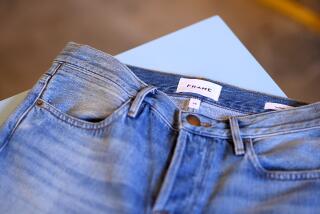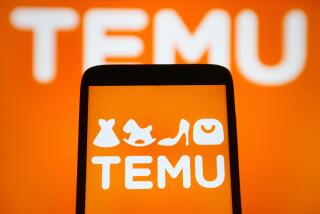Limited Accused of Skirting U.S. Import Quotas
- Share via
Is Limited Inc.--owner of Victoria’s Secret, among other specialty apparel chains--secretly mislabeling Chinese-made garments to evade U.S. import quotas?
That’s the accusation made by a textile manufacturers’ group in a lawsuit--which has wide implications for the future course of U.S. trade policy--filed recently in Los Angeles federal court. In the suit, the American Textile Manufacturers Institute (ATMI) charged that the giant retailer and one of its Los Angeles-based apparel contractors allowed “Made in Hong Kong” labels to be affixed to garments actually made in China.
The lawsuit alleges that Limited used that maneuver to circumvent U.S. import quotas on Chinese-made garments. Although Hong Kong goods are also subject to an annual import ceiling, the colony’s manufacturers consistently fail to meet it--leaving a gap that can theoretically provide illicit cover for importers of Chinese goods.
Limited, the most prominent retailer ever accused of this kind of quota fraud, has denied the charges and is expected to try to persuade a judge to dismiss the case at a hearing in downtown Los Angeles on Monday--the day before Britain relinquishes control over Hong Kong to mainland China. Limited’s co-defendant, Los Angeles-based contractor Tarrant Apparel Group, also called the suit groundless.
Should Limited lose the case, it could be subject to millions of dollars in civil penalties. But much more is at stake.
For one, the case pits two champions of the opposing camps in the rancorous political debate over U.S. trade with China.
ATMI, the plaintiff and a lobbyist for domestic textile makers, is seeking to restrict trade with China on the grounds that the Beijing regime routinely violates human rights and is an untrustworthy trade partner.
Limited, the nation’s largest specialty apparel retailer, is a leading lobbyist for expanding trade with China. (The company declined to disclose what portion of its inventory is manufactured in China or the Far East.)
Proponents of freer trade with China say a ruling against Limited could embolden opponents to press for tighter import quotas on Chinese goods, leading to higher clothing prices for millions of American consumers.
The battle between those two sides is fierce and long-running.
The House of Representatives on Tuesday voted by a narrower margin than last year to extend China’s most-favored-nation trade status, which gives its goods relatively low tariff rates. But human-rights advocates and trade hawks vow to continue to seek trade restrictions, and some members of Congress have promised to bring restrictive legislation to the floor this year.
Also at issue is China’s proposed membership in the World Trade Organization, an international body that sets global trade rules and is phasing out apparel quotas for member states, including the United States. The textile manufacturers institute opposes China’s membership on grounds that exporters to the country still face numerous trade obstacles, while Limited and other retailers are urging U.S. officials to support China’s application.
In fact, it is Limited’s role as a major lobbying force for China trade that has many in the apparel and retail industries speculating that the textile institute’s real goal in its lawsuit is to influence policymakers in Washington.
“If the Limited loses this court case, the public would begin to view the company as a smuggler and the company would lose much of its ability to influence Congress on trade issues,” says Gary Hufbauer, an economist and director of studies at the New York-based Council on Foreign Relations. “The company could come out of this with a black eye.”
At the core of the case are the results of what the textile institute says is old-fashioned gumshoe-style detective work.
According to the group’s lawsuit, a private investigator it hired found evidence that a Hong Kong garment contractor for Limited, Gaddy Garment Factory Ltd., arranged quota-evading transshipments for the U.S. retailer.
ATMI says its investigator determined that Gaddy did not have the factory capacity to produce the apparel that was shipped under its name.
“At no time did ATMI’s investigators observe any indication that Gaddy was engaged . . . at a commercially significant level in the cutting of fabric to shape, the sewing of fabric pieces or any other operation regarded by customs as conferring origin on apparel products,” the suit says.
The suit says that Gaddy was a front for two China-based factories that actually produced the garments for Limited. Gaddy regularly sent faxes to the Chinese enterprises to set up fabric-cutting schedules, production changes and shipment deadlines, according to the suit.
“Finally,” the suit says, “Gaddy issued specific directions for the printing of cartons with ‘Made in Hong Kong’ marks for the shipment of garments fully cut, made and finished in China.”
Limited, a Columbus, Ohio-based company with 13 retail operations--including Lane Bryant and Victoria’s Secret--denies those allegations.
“The company’s policies require vendors to comply with all U.S. laws--including the customs laws--and it has procedures in place to ensure that its vendors comply,” Michael Canter, a lawyer for Limited, said in an interview with The Times.
Limited also argues in legal briefs that ATMI provides no evidence of a specific “date, time or place where the Limited defendants submitted a false document or otherwise acted improperly.”
Limited’s general counsel, Samuel P. Fried, said the company has a policy of “zero tolerance for any violation of its policies or any law.”
U.S. textile groups have long alleged that Hong Kong firms function as fronts for illegal transshipments. This is clear because the British colony’s apparel industry work force is too small to produce the quantity of clothing and textiles bearing its label, said Carlos Moore, executive vice president of ATMI. Hong Kong filled about 80% of its U.S. quota allotment in 1996.
The textile group says its suit is a new way to halt quota-busting shipments that do further harm to domestic textile and apparel producers already losing sales and jobs to legitimate imports.
Since the U.S. agreed to an international trade system setting adjustable import quotas on various goods in 1974, U.S. apparel and textile producers have steadily lost ground at home, dropping to about 40% in domestic market from 88% in 1973.
In contrast, China has become the world’s largest garment exporter, ranking second to Mexico as an apparel products supplier to the United States in 1996.
China last year filled at least 90% of its U.S. quota in the 150 apparel-related classifications established by international agreement and totally filled its U.S. allotment in some of those categories. China legally exports about $5 billion worth of apparel and textiles to the United States--but customs officials estimate that $1.8 billion more in Chinese garments and fabric illegally enters the country each year.
China accounts for about 90% of all apparel quota fraud, said Janet Labuda, director of trade management at the U.S. Customs Service.
“We believe this is a very serious problem,” she said.
More to Read
Inside the business of entertainment
The Wide Shot brings you news, analysis and insights on everything from streaming wars to production — and what it all means for the future.
You may occasionally receive promotional content from the Los Angeles Times.










